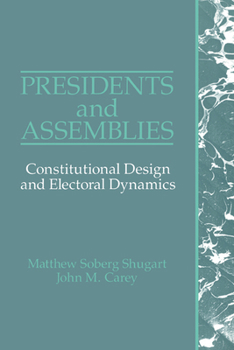Presidents and Assemblies: Constitutional Design and Electoral Dynamics
Select Format
Select Condition 
Book Overview
In recent years renewed attention has been directed to the importance of the role of institutional design in democratic politics. Particular interest has concerned constitutional design and the relative merits of parliamentary versus presidential systems. A virtual consensus has formed around the argument that parliamentary systems are preferable overall to presidential systems, due largely to the loss of power to the executive and assembly in presidential systems. In this book, the authors systematically assess the strengths and weaknesses of various forms of presidential systems, drawing on recent developments in the theoretical literature about institutional design and electoral rules. They develop a typology of democratic regimes that are structured around the separation of powers principle, including two hybrid forms, the premier-presidential and president-parliamentary systems, and they evaluate a number of alternative ways of balancing powers between the branches within these basic frameworks. They also demonstrate that electoral rules are critically important in determining how authority can be exercised within these systems, describing the range of electoral rules that can be instituted and the effects they have on the shape of party systems, on the political agenda, and on the prospects for cooperation between presidents and assemblies.
Format:Paperback
Language:English
ISBN:0521429900
ISBN13:9780521429900
Release Date:August 1992
Publisher:Cambridge University Press
Length:332 Pages
Weight:1.05 lbs.
Dimensions:0.8" x 6.1" x 9.2"
Customer Reviews
0 rating





